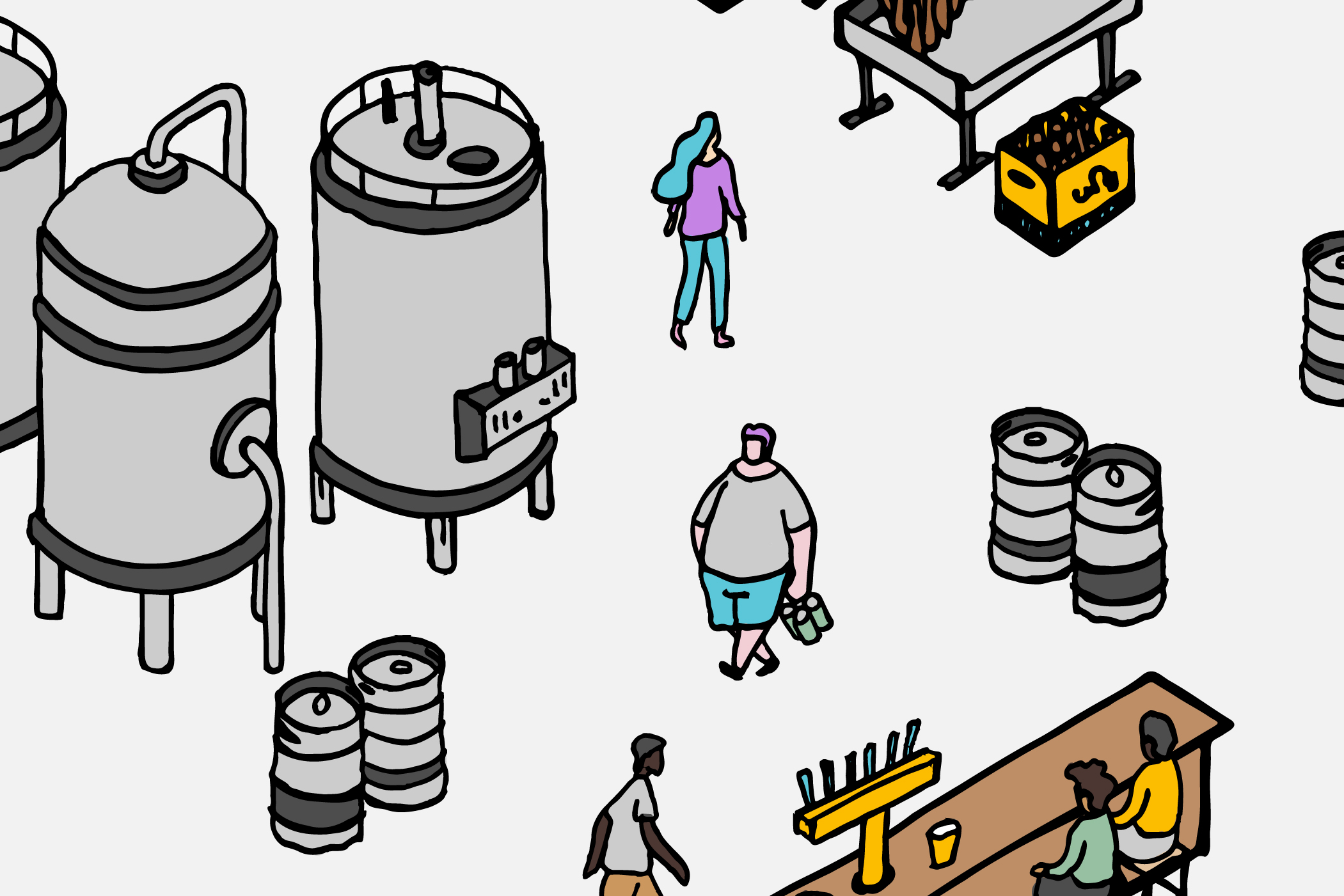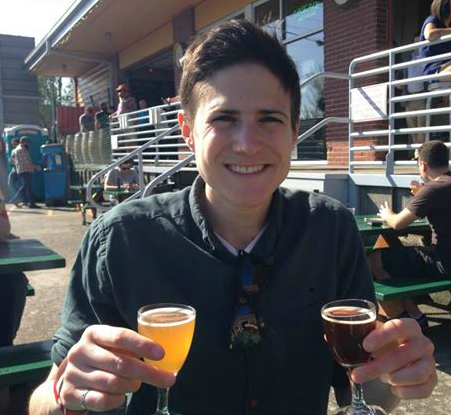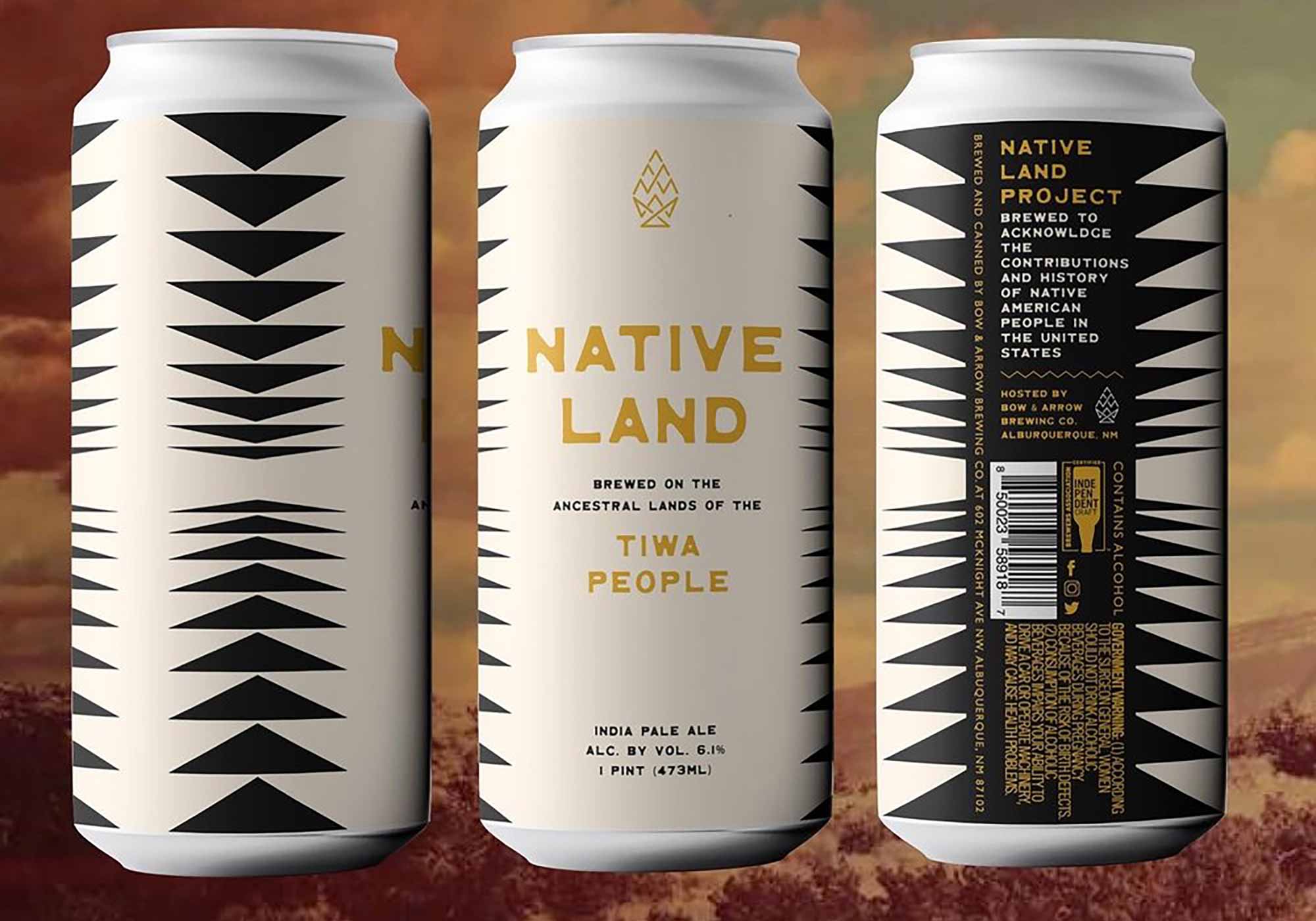Shop
Creating Safer Spaces in Craft Beer, Part Seven — Brewing Beers That Make a Difference
Part seven of ten.
“Creating Safer Spaces in Craft Beer” is an in-depth, ten-part series examining why it’s important to embrace diversity, equity, and inclusion in craft beer. Every Monday for the next ten weeks, we’ll be releasing a new part to the series.
[Creating Safer Spaces in Craft Beer, Part One — Why Isn’t Craft Beer More Diverse?]
[Creating Safer Spaces in Craft Beer, Part Two — What Does a Safe Space Look Like?]
[Creating Safer Spaces in Craft Beer, Part Three — Does Every Brewery Needs a Code of Conduct?]
[Creating Safer Spaces in Craft Beer, Part Four — Hire Intentionally and Train Your Team]
[Creating Safer Spaces in Craft Beer, Part Five — Start a Vocational Program]
[Creating Safer Spaces in Craft Beer, Part Six — Crafting Inclusive Events for Your Community]
At the end of the day, what do breweries do best? It’s a bit of a rhetorical question: breweries brew beer.
Of all the ways for a brewery to become more inclusive, brewing might be the simplest. After all, breweries do that every day.
“Creating Safer Spaces in Craft Beer” is an in-depth, ten-part series examining why it’s important to embrace diversity, equity, and inclusion in craft beer. Every Monday for the next ten weeks, we’ll be releasing a new part to the series.
[Creating Safer Spaces in Craft Beer, Part One — Why Isn’t Craft Beer More Diverse?]
[Creating Safer Spaces in Craft Beer, Part Two — What Does a Safe Space Look Like?]
[Creating Safer Spaces in Craft Beer, Part Three — Does Every Brewery Needs a Code of Conduct?]
[Creating Safer Spaces in Craft Beer, Part Four — Hire Intentionally and Train Your Team]
[Creating Safer Spaces in Craft Beer, Part Five — Start a Vocational Program]
[Creating Safer Spaces in Craft Beer, Part Six — Crafting Inclusive Events for Your Community]
Benefit beers or beers that support a cause aren’t anything new. But they can be a fantastic way to attract an untapped pool of consumers and support various causes if approached thoughtfully.
“Who is involved in the collaboration? Who is designing it? If we’re saying this is a beer for a community, certainly the people supposedly being amplified in this should be involved in vocalizing what it should look like, and absolutely an organization that serves the community we’re seeking to amplify should benefit from it,” says Courtney Simmons*, New Belgium’s former Director of Diversity, Equity, and Inclusion.
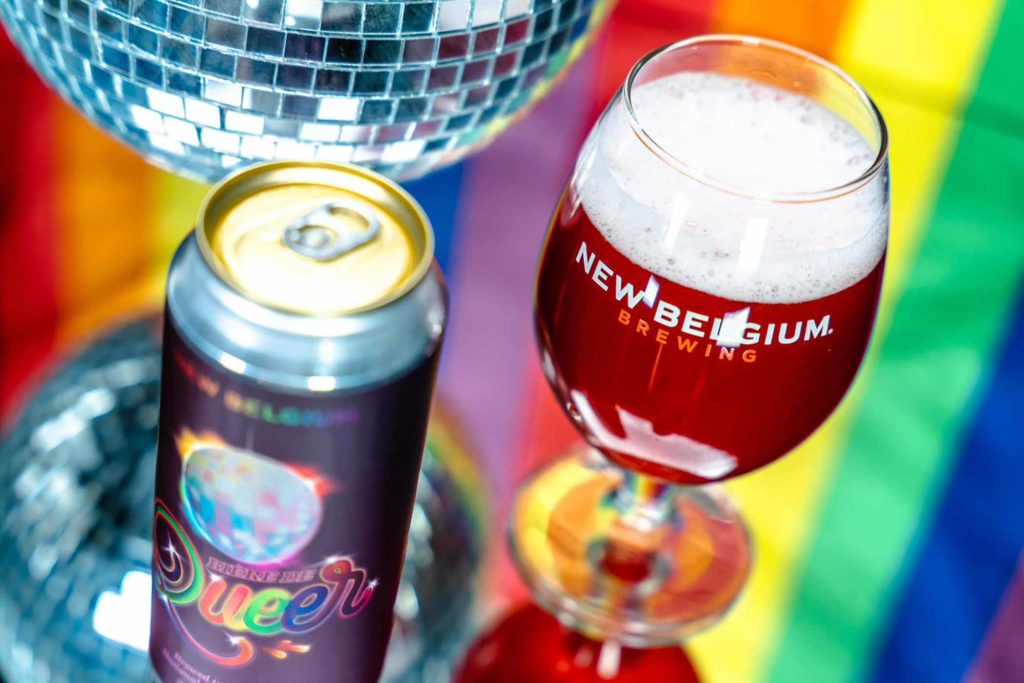
Photography courtesy of New Belgium
In 2021, New Belgium released a beer called Biere De Queer, commemorating National Coming Out Day. One hundred percent of all proceeds from the beer benefited New Belgium’s hometown LGBTQIA+ communities and allies.
This beer is just one example of how to use beer as a platform for social change. Let’s take a look at some great examples of benefit beers and examine how to go about creating one.
*Editor’s Note: While putting together this piece, Simmons left New Belgium and is focusing on building her own DEI consultancy and continuing her advocacy work through Equality Michigan. New Belgium’s DEI team remains in place and continues the work described in this article, reporting directly to Chief ESG Officer Katie Wallace in the interim.
Using Beer as a Vehicle for Social Change
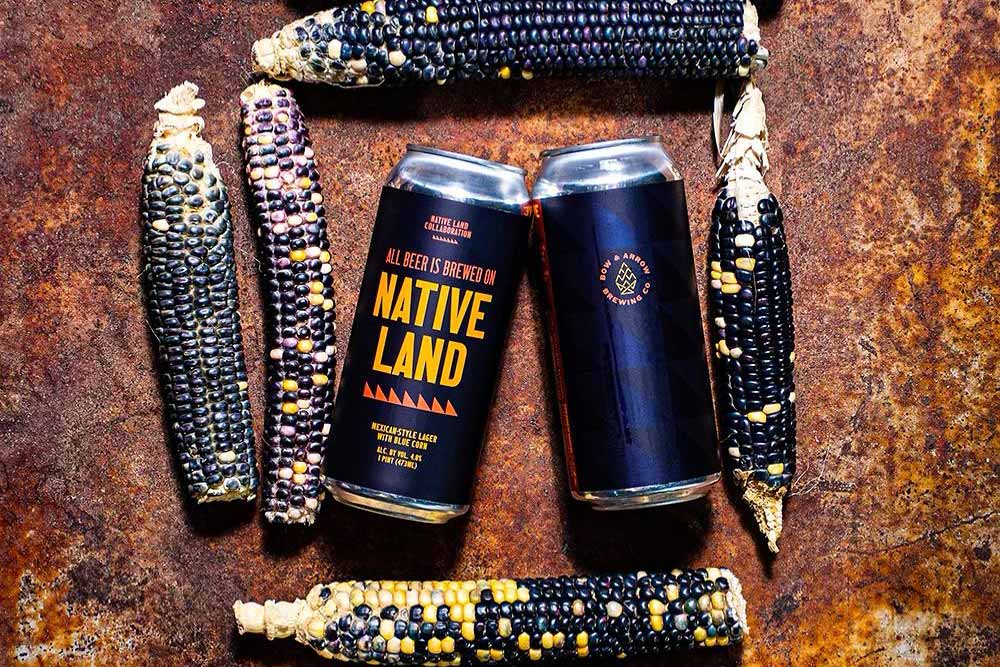
Indigenous-owned Bow & Arrow Co-Founders Shyla Sheppard and Missy Begay started a collaborative beer project called Native Land, acknowledging that all beer is brewed on Native land | Photography courtesy of Bow & Arrow Brewing Company
Two years ago, Indigenous- and Queer-owned Bow & Arrow Co-Founders Shyla Sheppard and Missy Begay had an idea.
“We didn’t set out to be the first Native-, women-owned brewery,” says Sheppard, but over time the co-founders realized they had created a powerful platform with their business. “Let’s use it to focus on educating folks because we are unique, but we’re not the only ones, and we won’t be the last.”
To be present and enforce their visibility as Queer, Native women, Sheppard and Begay started Native Land, a collaborative beer project increasing awareness, setting a precedent that “all beer is brewed on Native land,” and raising funds for current Native communities and organizations.
Any brewery across the country can participate, accessing the beer’s recipe and label. But anyone who does commits to donating beer proceeds to Native American non-profits focused on ecological stewardship, access to ancestral lands, or revitalization of traditional agriculture and foodways.
In its first year, Native Land raised nearly $90k with forty-seven participating breweries in twenty-three states and Canada. “I still get goosebumps,” says Sheppard when she thinks about the project’s inaugural year.
While Bow & Arrow developed a hazy IPA for last year’s recipe, in 2023, they’re featuring a Mexican-style lager with the idea of using heritage corn if one has access to it.
So far, forty breweries have already committed to participating in Native Land.
This year, Bow & Arrow will donate proceeds from its Native Land beer to Navajo Ethno Agriculture, an educational farm “on the rez in the Four Corners area,” says Sheppard. The organization plants traditional heirloom varieties of corn and teaches kids how to harvest them, from planting the seed to prepping the field.
“We want to remind people that Native people are still here, we’re still present, and we exist in this contemporary space,” says Sheppard. “We own breweries, we’re doctors, we’re lawyers, we’re public servants.”
Sheppard emphasizes the importance of Native Lands for future generations. “Don’t let these stereotypes and limitations that other people impose on you limit your options for your future, pursuing your dreams and goals,” she says. “This is more than just a land acknowledgment. It’s creating awareness that Natives are not only an important part of this country’s history, but also we’re still here. I think that is a critical part of this. Generating resources to these organizations currently dedicated to strengthening and empowering contemporary Native people is an important aspect of what we’re doing.”
The key to any of these benefit beers or projects is that they can’t simply profit off of others’ marginalization. That’s called being performative—engaging in an action to look a certain way without actually speaking to the community you’re purporting to support.
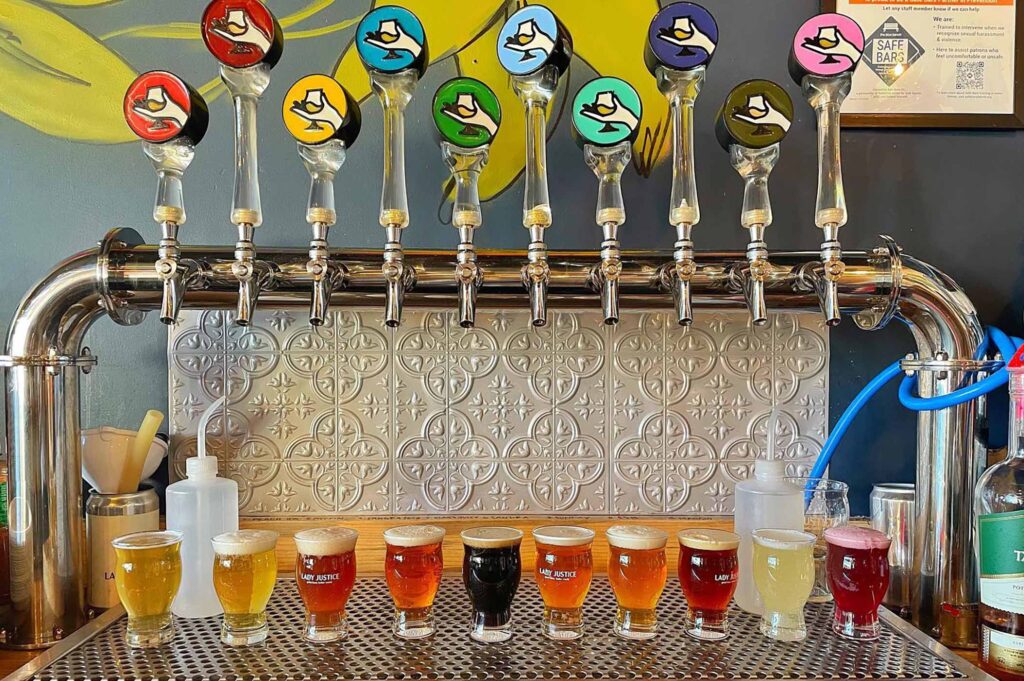
Photography courtesy of @ladyjusticebrewing
Queer-, female-, and Latina-owned Lady Justice Brewing in Colorado has a business model built on giving back consistently. They donate one-hundred percent of profits over cost from their membership club to two different non-profits every year.
Lay says that from the brewery’s memberships alone each non-profit organization they chose to work with will get somewhere between four and six grand.
Additionally, they have a line in the taproom called Pouring Goodness, where $1 from every 13oz pour of the Pouring Goodness tap in a given month goes to a particular local organization. Since opening, Lady Justice will have raised $50,000 and counting for almost 90 organizations by the end of 2023, according to Lady Justice Co-Founder Betsy Lay. Each organization Lady Justice collabs with opens up new avenues for customers to come into the taproom just because they want to support a local organization or cause.
“We exist particularly to give that money away,” Lay told Hop Culture. “If Lady J stopped doing that, I think Lady J would have to close because that’s not our mission.
Similarly, over the last few years, Goldspot owner Kelissa Hieber shares that her brewery has donated tens of thousands of dollars to various organizations from their benefit beers or events.
For instance, Gender Fluid originally started as a beer to raise money for one of her bartender’s gender-affirming surgery. Matching the amount raised from $1 per pint poured, Hieber morphed that beer into a series that donates to a different organization every time, such as Denver Community Fridges or the Transformative Freedom Fund.
Most recently, Hieber started the Out Loud Beer Project with Everywhere Is Queer, a collaborative beer recipe open to anyone to brew as long as they donate twenty-five percent of all profits to Everywhere Is Queer and a Queer non-profit of the collaborating brewery’s choice.
The project takes cues from one of the all-time most successful beers benefitting a single cause.
Black is Beautiful, aka the Beer Industry’s Most Successful Beer for a Cause
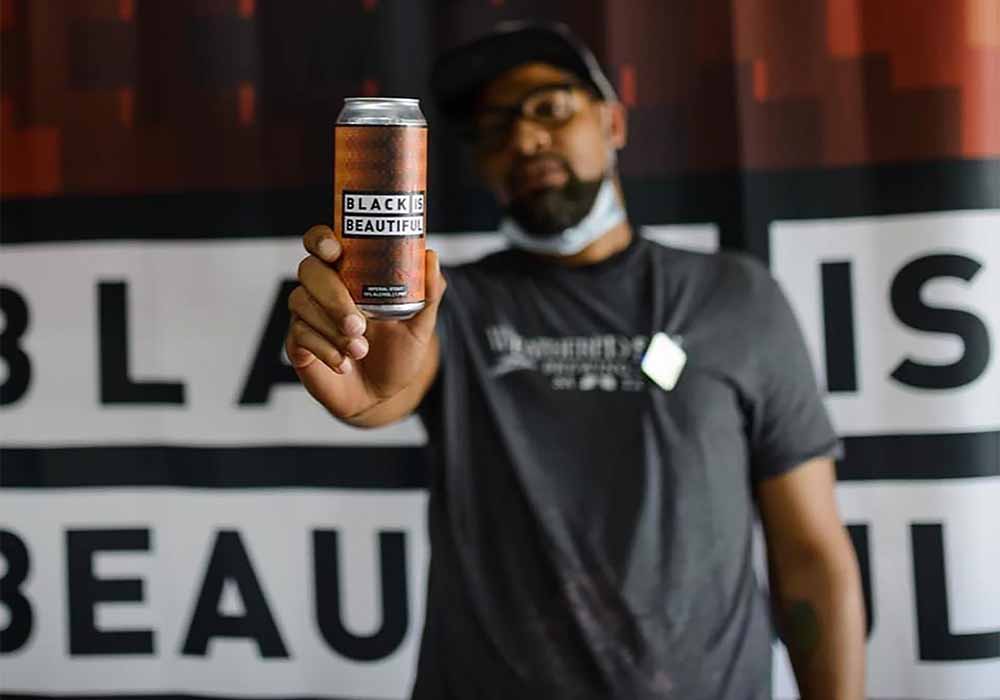
Photography courtesy of Marcus Baskerville
Black Is Beautiful is an imperial stout with a serious mission.
An initiative started by Weathered Souls Brewing Co-Founder Marcus Baskerville to “bring awareness to the injustices that many people of color face daily,” Black Is Beautiful is a collaborative beer project that has accumulated 1,601 participating breweries and allied trade participants representing 50 states and 28 countries. It has also raised more than $5.1M for 501c3 organizations.
“As a black business owner, how can I contribute to the cause?” Baskerville told Hop Culture. “What can I do to show my support and stand in unison with the issues of police brutality going on now?”
Initially, Baskerville planned to release a single beer under the Black Is Beautiful label. But his mentor Jeff Stuffings challenged him to make the project bigger.
With the support of Stuffings, Baskerville approached several breweries about the concept.
Like Khris Johnson, co-owner and head brewer of Green Bench Brewing Co., the first Black-owned brewery in Florida.
“Being a man of color, I’ve experience how police treated me versus my friends or white colleagues,” Johnson said in Aaron Hose’s documentary on Black brewers and brewery owners called One Pint at a Time, which in part chronicles the rise of Black Is Beautiful. “It’s always been an initiative of ours personally to do our best to create an environment where people feel welcomed and people feel it’s acceptable to be whoever they are here.”
For every beer brewed under the Black Is Beautiful label, Baskerville encourages participants to donate one hundred percent of proceeds, “to your local foundations that support police brutality reform and legal defenses for those who have been wronged.”
And to have conversations about the lack of diversity in beer.
Shaun P. Harris, co-owner and brewmaster of Harris Family Brewery, the first Black-owned brewery in Pennsylvania, says in the documentary that when people “start sharing a beer, you start talking about culture, you start talking about things you have in common until things you don’t have in common don’t even matter.”
Harris Family brewed its Black Is Beautiful beer in collaboration with Love City and Two Locals several years ago. For Harris, who grew up in Philadelphia and said he had complicated dealings with law enforcement the beer has helped contribute to the narrative of change. “We hoped people who enjoy craft beer would…see the movement and energy behind this product and start to have conversations, asking really difficult questions you have to ask in the mirror first before you start asking them in public,” he said. “We can start to make a small change, but any amount of change is good.”
Most recently, the Black Is Beautiful collaboration returned, launching Volume 2 on July 17, 2023, with the aim to raise $1 million for the National Black Brewers Association.
How to Authentically Brew a Beer That Makes a Difference
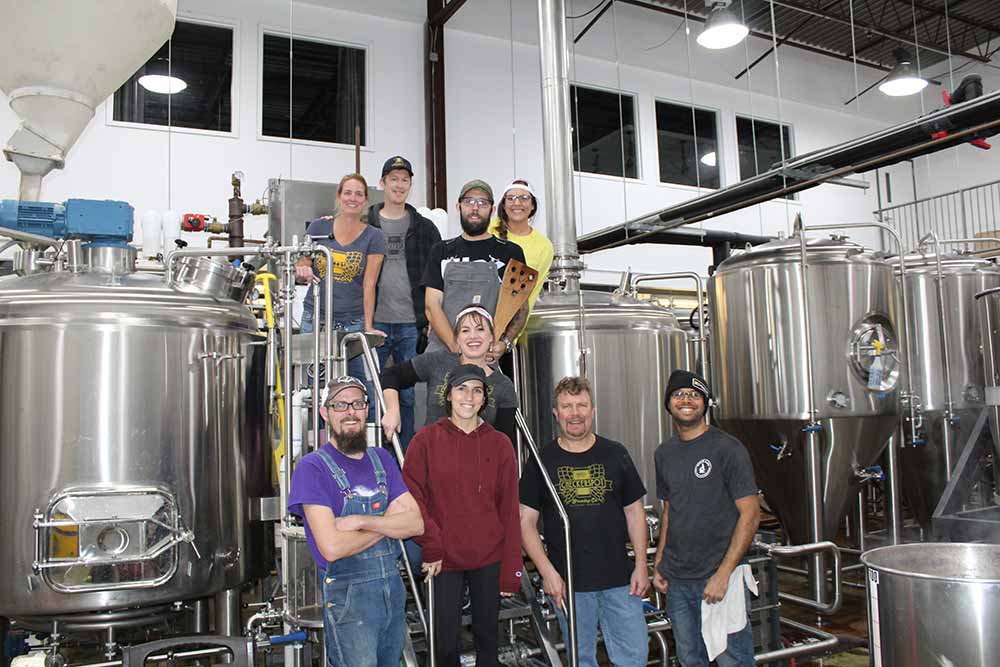
Checkerspot brews Daily Dose of Freedom in 2022 | Photography courtesy of Checkerspot Brewing
At Checkerspot Brewing in Baltimore, MD, beers that support the community are a big reason the brewery was chosen as, last year’s winner of Boston Beer’s Brewing the American Dream program–beers that support their community are a big reason why Boston Beer chose them.
When I spoke with Checkerspot Co-Founders Judy and Rob Neff, they emphasized brewing beers that give back to their community as foundational to their business.
“One of my favorite things is you can use beer to do more to give back so much more than you could as an individual,” Judy told Hop Culture. “From raising awareness to different groups to donating beer to a ton of non-profit events to raise money.”
Along those lines, Judy brewed a beer called Daily Dose of Freedom with a veteran homebrewer. The proceeds ($1 from every pint sold) went to a different organization supporting veteran rights yearly. Although Now, Judy and her husband Rob aren’t veterans, but they found someone in the space who could authentically represent that community and partnered with him, getting to know him and his whole family, brewing with him, and supporting him.
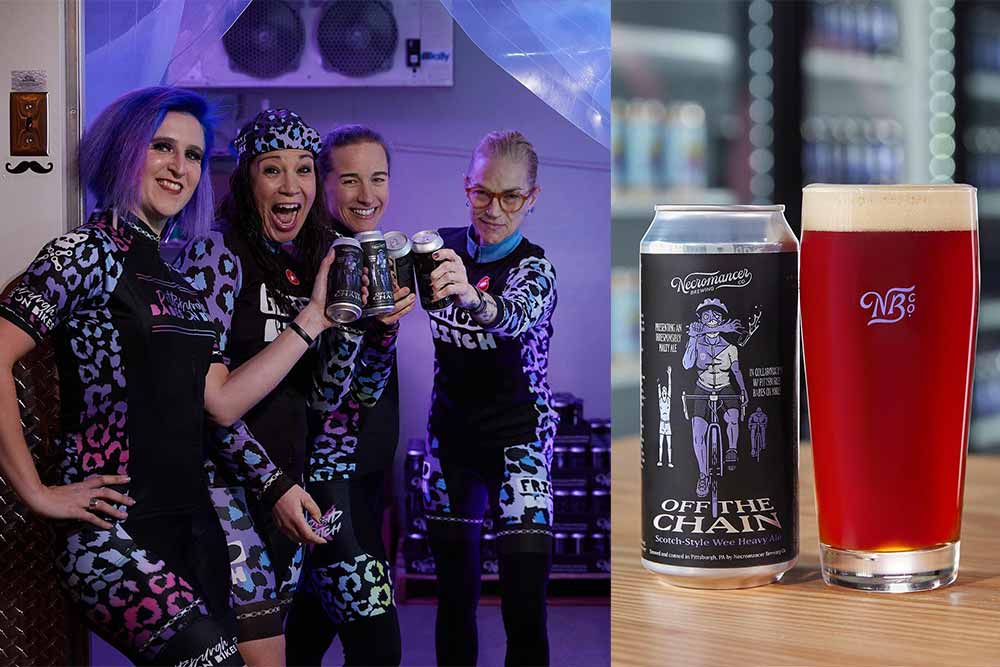
Necromancer Brewing Frigid Bitch collab called Off the Chain | Photography courtesy of @necromancerbrewing
Similarly, at Necromancer Brewing in Pittsburgh, every collaboration starts with the brewery sitting down with their partner to explore everyone’s needs and goals.
“It’s a full-on collaboration,” says Necromancer Head Brewer Lauren Hughes, recalling a recent collab beer they brewed for Frigid Bitch, an all-female and non-binary alley cat race hosted by Pittsburgh Babes on Bikes that raises money for the local women’s shelter. “We won’t just brew a beer, tell you what it is, and give five bucks… We invite everyone to hang out, and we are upfront with how much we can donate.”
Hughes says oftentimes if the beer isn’t raising enough money, Necromancer will add more out of its own pocket just because “we f***king love this organization and what they do, and we’d like to help them keep doing what they’re doing.”
To that note, it’s important to partner with organizations you feel connected to or support a cause you’re passionate about.
“You can give money to anybody, and that’s great, but when it’s more personal or an organization and a community that you care about and are interested in helping…that makes it more worthwhile,” says Hughes. “It has to be a partnership.”
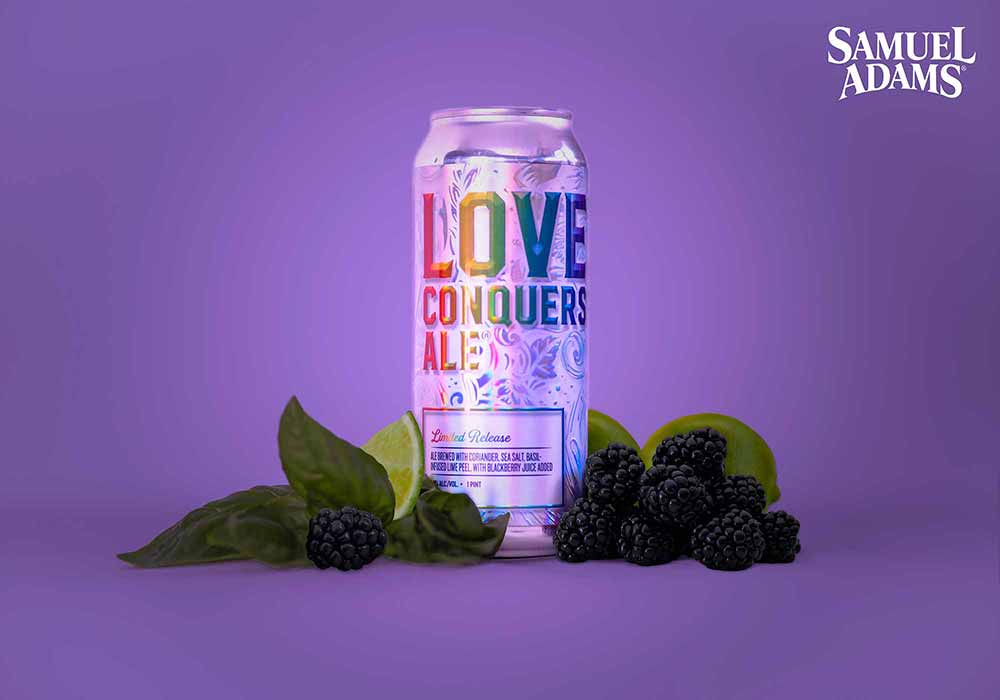
Photography courtesy of Samuel Adams | The Boston Beer Company
When Samuel Adams first brewed a blackberry lime gose called Love Conquers Ale, meant to amplify the voices of the LGBTQ+ community and “celebrate [Pride in] all of its color, unique spirit, and energy,” they knew they needed a partner that reflected the enormous message of the beer.
Samuel Adams partnered with GLAAD, an organization committed to rewriting the script for LGBTQIA+ acceptance, donating $100,000 to the organization that first year.
Samuel Adams went all out using the beer as a foundation to create an entire Love Conquers All platform. Boston Beer Brewer and Director of Partnerships Jennifer Glanville told me, “We started the platform to live our brand values and strongly communicate our message of inclusiveness and unity as allies of the LGBTQ+ community.”
All these beers show where breweries can make the most impact by doing what they do daily.
Make sure that whomever you partner with, you get to know those people or that organization, be intentional and authentic with your collaboration, and–without question–share all or a portion of the profits with the cause you’re supporting.
Up next: Creating Safer Spaces in Craft Beer, Part Eight — Consumers Can Champion Underrepresented Breweries

